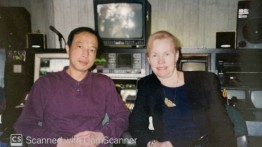Janet Paxton Gardner A'65
As the director of multiple award-winning documentaries and narrative films, Janet Paxton Gardner is committed to giving history a human face. She’s taken on films that explore themes of identity, social justice, and power dynamics. Her studies at the School of Art at The Cooper Union not only informed her visual and aesthetic acuity, but also introduced her to the story of the school’s founder, Peter Cooper, who was the subject of Gardner’s 2009 film, Mechanic to Millionaire: The Peter Cooper Story.
Gardner began her career in television journalism when, after attending New York University’s Graduate Institute of Film and Television (now Tisch School of the Arts), she worked a field producer, film editor, and news writer for NBC News and WNBC-TV, WRC-TV (Washington, D.C.) and CBS News. As a print journalist, she was a feature writer for The Plain Dealer and contributed to The New York Times, Philadelphia Inquirer, and Boston Globe.
In 1990, she founded The Gardner Group, Inc. to direct and produce documentaries with a focus on hidden history. Film credits include a trilogy about the history and culture of Vietnam: Emmy-nominated A World Beneath the War (PBS/Discovery Channels International, 1997); Precious Cargo (produced in association with ITVS (PBS/ National Geographic Channels International, 2001) about the return to Vietnam of the first generation of Vietnamese adoptees from Operation Baby Lift; and The Last Ghost of War (narrated by Kevin Kline, distributed by PBS International, 2007), which follows the court trials resulting from the grim aftermath of herbicides sprayed during the Vietnam War and was co-produced by Pham Quoc Thai.
Two of Gardner’s films explore the Cambodian genocide: Dancing Through Death: The Monkey, Magic & Madness (PBS/ STARTV, 1999); and Lost Child: Sayon’s Journey (presented to PBS stations by WNET Channel 13 for broadcast, 2015). The first tells the story of Cambodian monkey dancers striving to rebuild their centuries-old tradition of storytelling after Asia’s most devastating holocaust, while Lost Child is a personal account of a former Khmer Rouge child soldier.
In 2015 she was awarded a highly prestigious Guggenheim Foundation fellowship. Though the prize was given in part to support Quakers: The Quiet Revolutionaries, it was also awarded as recognition of Gardner’s sensitive and insightful body of work and her determination to speak truth to power on film.






